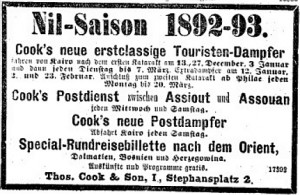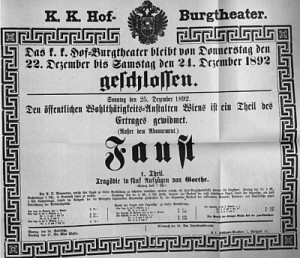When I woke up early in the morning, many activities around SMS Elisabeth was already going on in full force. With infernal yelling, customary to the place, coal was embarked onto the ship. Out of countless canoes circling around our ship, with naked brown or black boys on board, came howling cries for baksheesh. The small Arabs and Somalis, splendid fellows, were diving for the coins we threw as prizes into the sea. The dexterity and stamina of these boys, many of which not yet six years of age, astonished us. How they moved under water only to finally re-emerge with their mouth full of copper coins. Anna upon Anna, a small East-Indian coin of around 5 Kreutzer in value converted at the time, flew from board into the sea and we enjoyed watching that funny activity for a long time.
In the mean time, Jewish merchants and peddlers from the Parsis tribe had climbed on board and offered ostrich feathers, antelope horns, conches, local weavings and many other products so that a brisk trade was established at the gangway. The productivity of the area around Aden is so minimal that only small objects created by a cottage industry or hunting prizes or beach hauls were displayed as indigenous trade goods.
Aden with Perim, Little Aden and the newly acquired territories are part of the Bombay presidency and are governed by a political resident. Aden is in English possession since 1839.
The south oriented peninsula jutting out into the sea carries on its East coast the fortress city of Aden, on the West coast 8 km distant the small harbor city Steamer Point. As the harbor of the actual city, East Bay, offers shelter to ships only during the summer months, all trade has shifted to West Bay, a good roadstead.
Aden’s population including that of Perim but excluding the garrison counts 35,932 souls consists mainly of Arabs and Somali Negroes. The peculiarity of this bustling place brings about that, besides Asian and African people, members from different nations create a colourful mix of people.
What Aden is, has been entirely created by trade. Aden’s exports had a value of 26,067.306 fl. in Austrian currency in 1892, the imports a value of 30,788.033 fl. in Austrian currency. In the year 1892, 1572 ships with 2,582.221 tons entered port and 1573 ships with 2,585.808 t departed port.
The territory of Aden yields only very meagre products due to the tiny amount of rain and the rocky soil that is only partially open for cultivation. Part of the victuals thus have to be imported from more advantaged surrounding regions and from the Somali coast.
Steamer Point harbour is picturesquely encased: In the East rises the mighty, steeply jagged crater of Jebel Shamsan, to the North the high mountains of the Arabian coast are visible whose terraces crash down to the beach. Especially at sunset, when the horizon is glowing red and green, it creates a powerful image so that a visitor might think to look at a vividly painted theatre stage decoration.
At 8 o’clock, the territorial salute of 21 rounds was fired which was answered by the land battery. Then resident general J. Jopp in a scarlet red uniform of a brigadier general came on board and invited me to a luncheon, a dinner and a lion hunt. In consideration of the very limited time allocated to my stay, I had to decline all these offers with thanks. Because General Jopp only speaks English, I had to call the captain for assistance as an interpreter. The Resident, he had spent 36 years in India before he was given the post in Aden, is said to be a great tiger hunter and has personally killed more than 70 tigers, certainly a colossal result as these animals in all probability aren’t as common in India as hares in a field.
After the visitor had bid farewell, I changed out of the uniform adapted for tropical use that I had put on to honour him and went on land to visit Steamer Point and Aden as well as make some purchases.
In the black wagon of the consular agent, driven by a black Somali, we drove first to the military quarters of Steamer Point where barracks stack upon barracks and officer barracks stand row upon row, mostly airy one storey buildings with verandas and flat roofs in red and white, standing on the yellow sand or on naked volcanic stone without any vegetative decoration. Numerous tennis courts as well as cricket and football grounds are tribute to the fact that Englishmen are housed here. The garrison consists of around 2500 men, the artillery is one company strong, the cavalry one squadron; the rest of the troops are infantry – bronze colored Indians tall as trees in their practical and really becoming uniforms.
The non-military part of Steamer Point is situated on a semicircle quay and contains mostly big stores, as well as the consulates and two hotels; large coal depots, storage areas and wharfs are situated next to the quay and continue alongside the road to Aden.
The Jewish element is strongly represented in Steamer Point. As soon as a European sets foot on land he is surrounded by a flock of Semitic moneychangers in original costumes with long sidelocks. They do business very aggressively. Very comical also was a very small boy, around eight years of age, who declaimed the values and rates of many different currencies with ease.
My first visit was to the resident who, together with his very charming wife, occupied a very pleasant ground-level house equipped with all comforts in the middle of the military quarters, with a beautiful view of the sea. In the house, it was refreshingly cool. One could almost forget the tropical heat that ruled outside. The visit could not last long as we had to depart early.
In a small one-horse wagon with a top we drove quickly on the first-rate roads to Aden where a very colourful view presented itself to our eyes. Long caravans moving at a slow pace, heavily burdened camels. Silent Arabs, clad in long burnous, or bawling half-naked Somalis riding on dromedaries or on small donkeys. One wagon after the next came near. One a vehicle of a Parsis who can be identified by his distinct headdress. Another one filled with a full harem of veiled women. Somalis, men and women all to the last person beautiful, like statues cut out of ore, the head most often closely cropped or with but a short bit of curly hair, walked with uncovered heads in the heat of the sun and the dust of the road. Bleating, blocking herds of fat-tailed sheep moved along the road creating whirls of dust. To the right and left sat or circling in the air were visible countless vultures and harriers.
Through a small narrow gate cut into the stone one enters into the fortress zone of Aden which continues in a very smart way the peaks and ridges of the mountains and secures the whole city against any Arab desires of attack. After a few more skilfully built serpentines and two more tunnels we are in Aden, a city laid out as a square grid. Situated in the middle of a crater it offers a desolate view. Hot, clear and bare – that is the signature of the city and that of its enclosure. The sharply dropping rock walls, that are criss-crossed by caves, surround the city and are bereft of any vegetation. They serve as roosts and nesting places for all sorts of birds of prey.
Every stranger first visits the famous ancient cisterns. Large tanks, some cut into the stone, some cemented, hold about 1.5 million hectoliters that collect the water for the city during the heavy rains. A potent and imposing work that featured the only bushes and trees of the whole of Aden. Two handsome bulbuls were jumping around on them. During my visit nearly all of the cisterns were empty. Only from a cavern deeper down did some Arabs draw water which, however, tasted awfully.
The city itself impresses only by its monotone look of commonly built houses. All houses are low and stark white so that one looks like the other. In the way of compensation. There is a large variety of colourful crowds from all countries in the streets. Somali boys with happy and beautiful faces, pitch black eyes and impeccable snow-white teeth were circling around us like a swarm of bees. Eager for baksheesh, the cried and sang, demonstrated wrestling moves and performed their national dances, clapping their hands. When one threw a small coin among these boys, then such an imprudence was punished with a longer blockade of one’s way.
On the way back we passed by the „Towers of Silence“. These burial places of the Parsis are square small buildings on which they place their dead which are then eaten by vultures and eagles. This abhorrent practice offers the sole benefit of a quick disposal as in no time there is nothing left of a body but a few bony remains. A hundred full vultures were sunning themselves at the foot of the towers …
Through another gate that we entered the city we left the fortress and returned to Steamer Point.
Here we passed some hours, negotiating and bargaining, in the different shops, and finally returned on board, taking four Somali boys with us on board to have their photographs taken.
After Ramberg had completed the photography of the black quartet the youngest among them, a barely six year old boy astonished us against a small consideration with the feat of jumping with a header from the height of the bridge into the sea. Many an adult would have considered a jump from such a height too dangerous. Lavishly compensated, smoking cigarettes, the cute guys returned to the land with a miniature canoe.
The remainder of the day was given over to postal matters due to depart the next morning. This activity was interrupted by a curious intermezzo, namely the hoisting onboard of a number of Zebu oxen that did not cooperate in this activity and caused much trouble. One ox even jumped into the sea and could only with difficulty be fished out again.
Links
- Location: Aden
- ANNO – on 27.12.1892 in Austria’s newspapers. The Neue Freie Presse notes that the council of ministers has completed the draft of the next year’s agenda. The Hungarian prime minister wil arrive soon in Vienna and report about activities in Hungary. France continues to be stuck in diverse scandals.

